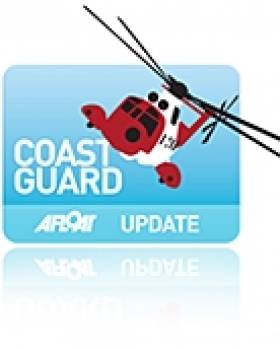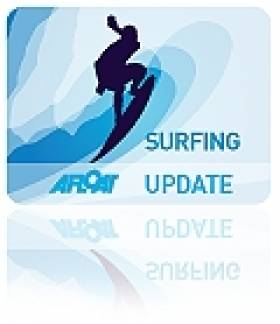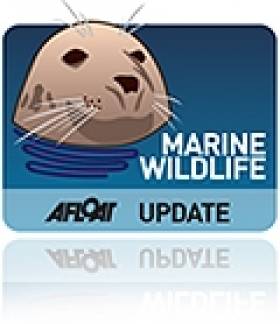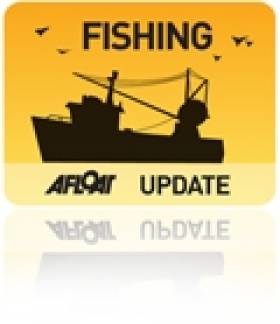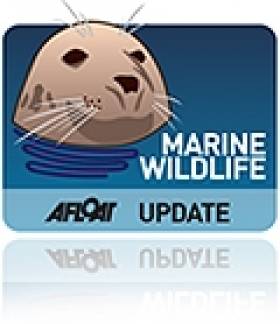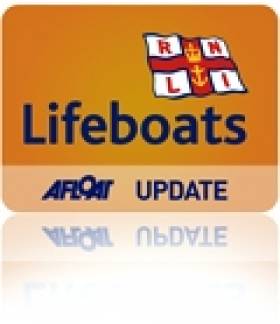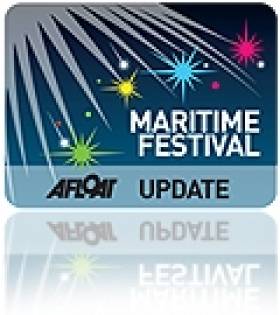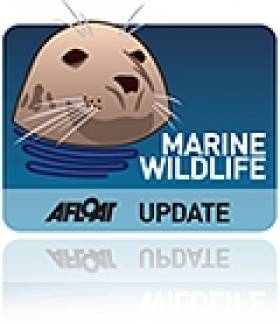Displaying items by tag: Donegal
Go-Ahead for Killybegs Coastguard Station
#COASTGUARD - The Office of Public Works has given the go-ahead to a long-awaited new coastguard station for Killybegs, the Donegal Democrat reports.
The multi-million-euro three-storey station - replacing the current 20-year-old building, which is deemed no longer suitable to demands - will be constructed at the Rough Point and will include a boat house and pollution control centre.
The Irish Coast Guard unit at Killybegs has 25 volunteer members, and also operates as a mountain and cliff rescue service. The unit serves one of Ireland's busiest ports.
The Donegal Democrat has more on the story HERE.
Easkey Britton Talks About Her 'Whirlwind' Year in Surfing
#SURFING - Irish surfing ace Easkey Britton sat down with Cooler magazine to chat about her "whirlwind" last few months.
Britton, who comes from the highly regarded Donegal surfing dynasty, has spent much of this year jugging her studies towards a PhD in marine science with her training for the European Surfing Championships in her home county this past September.
"I don’t know how anyone survives their PhD without being able to jump in the sea and catch some waves," she says. "It clears my mind, renews my energy – the best ‘study breaks’ you can get. And I appreciate the sessions I have a lot more."
Now heading into winter, with the surf getting bigger every day, she's in training with tow partner Neil Britton for the second Tow-In Surf Session at Mullaghmore Head.
She says of last year's inaugural competition: "The conditions were unreal. Huge, clean, light winds, sunshine. A very rare combo. It was our first ever experience of something like that. The crowds covering the headland were massive, it felt like an amphitheater, or being a gladiator in the arena!"
Britton also talks about how her family has been a big inspiration to her both in her life and her accomplishments on the surfboard.
Cooler has more on the story HERE.
Concerns Over Seal Deaths in Donegal
Seven dead seals washed up in Donegal are believed to have died of natural causes - but concerns over a pattern of seal deaths nationwide remain.
As the Donegal Democrat reports, the seven grey seals - which are a protected species - were found beached along with a dead dolphin in the Rosberg area.
A ranger with the National Parks and Wildlife Service confirmed that none of the marine animals had been shot.
But Pauline Beades of the Irish Seal Sanctuary said the find was just one in a series of reports of "strange" seal deaths around the country.
“You don’t find three, four, five animals dead on a beach," she said. "I would be very concerned that this is not a normal occurrence.”
It is not yet known if a post-mortem will be carried out in the dead seals, but members of the public are encouraged to report any similar finds as the thocine distemper virus has been responsible for seal deaths in the past.
Beades said that grey seals are now having their young, and asked the public to keep an eye out for seal pups and report anything that looks suspicious in the area.
The Donegal Democrat has more on the story HERE.
Crew Rescued from Sinking Fishing Boat off Donegal
The Irish registered 'Amy Jane' fishing vessel began taking in water about 13 miles off Malin Head this morning and was evacuated at 0945. The crew took to liferafts before being rescued. More details as we have it.
More from HM Coastguard
At 09.45am, Belfast Coastguard received a mayday call from a fishing vessel reporting that they were taking water and sinking.
The six crew of the fishing vessel took to their liferaft, dressed in their survival suits and took with them their EPIRB (Emergency Position Indicating Radio Beacon) which they had activated and a handheld VHF Radio.
Belfast Coastguard working with Malin Head Coastguard who had direct communications with the liferaft initiated a search and rescue mission to rescue the men.
The Irish Coastguard helicopter Rescue 118 based at Sligo was requested and was the Coastguard Helicopter Rescue 100 based at Stornoway.
The RNLI lifeboats from Portrush and Lough Swilly were also requested to launch.
The fishing Amy Jane SO876 registered in Sligo was 13 miles north of Malin Head when it made the mayday call.
The weather was reported as being North Westerly, Force 6 with a moderate swell.
Coleraine Coastguard rescue team are at City of Derry airport to receive the survivors.
Steve Carson, Watch Manager, Belfast Coastguard said:
We are pleased that this has been a successful rescue of six fishermen.
Sea Survival training which is undertaken by crew of fishing vessels and being properly equipped is a key factor in the rescue of these six men today.
Spanish Armada Wreck Discovered Off Donegal
RTÉ News reports that underwater archaeologists may have discovered a sunken ship from the Spanish Armada off the Donegal coast.
State funding has already been announced for an excavation of the wreck, which lies in shallow water at Rutland, near Burtonport.
Evidence suggests that the vessel is from the 16th century and was part of the 1588 expedition.
Minister for Arts, Heritage and the Gaeltacht Jimmy Deenihan described the discovery as "a major find of significance" to the world's historical and archaeological communities, adding that it could give greater "insight into life on board and the reality of the military and naval resources available to the Armada campaign".
RTÉ News has more on the story, including images and video, HERE.
Pilot Whales Returned to Sea, But 25 Die
Forty-four stranded pilot whales have been returned to open water after a mass beaching in the Scottish Highlands, The Independent reports.
Medics from British Divers Marine Life Rescue joined the coastguard and navy working through the night to right whales that stranded on their sides or backs, or on top of each other, before the morning tide.
Sadly 25 whales from the pod died at the Kyle of Durness, a tragic echo of last autumn's mass stranding in Donegal, where 33 whales were lost.
The Independent has more on the story HERE.
A volunteer lifeboat crewmember from Newcastle in County Down and his brother rescued two children and four adults from the freezing water after their boat sank off the coast of Donegal yesterday (Tuesday 12 July). The two brothers, Richard and Samuel Burgess were out fishing on a six metre RIB Blue Haven at around 4.30pm when they heard a call from Malin Head Coast Guard on their VHF radio seeking urgent assistance for an 18 ft cruiser that was taking on water and sinking off Port na Blath in Sheephaven Bay, county Donegal.
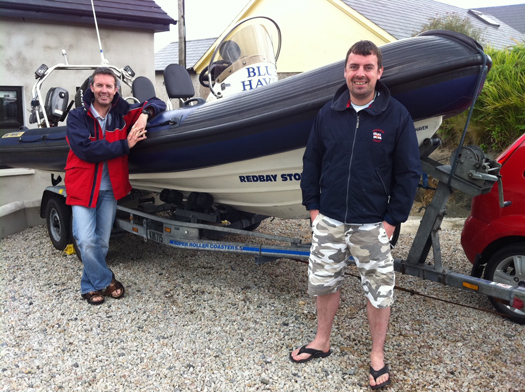
Rescuers Richard and Samuel Burgess and their Red Bay Stormforce RIB
Realising they were near the area they immediately made contact with the Coast Guard and made their way to the scene. On arrival they saw debris and a small part of the bow of a vessel protruding from the water. Two children and four adults were nearby in the water and wearing lifejackets. The brothers immediately went to their aid and recovered all six onboard their RIB. The men also took their fleece and jacket off to wrap around the two children to keep warm. They then made their way back to land and the group were met by representatives from the Downings Coast Guard with the children taken on to hospital to be checked out.
Commenting on the rescue Newcastle RNLI lifeboat volunteer Richard Burgess said, "I can't believe that on my holidays with my brother Samuel in Donegal, we were involved in the rescue of six people from the sea. I didn't expect to be using my RNLI training away from Newcastle but I am delighted we were close by and were able to help these people. I have been on the lifeboat crew for twenty months and the minute we arrived on scene my lifeboat training kicked in.
Conditions on the day were good and the group were about half a mile out from the shore but the area is very rocky and they would have been unable to make it to shore on their own. It could have been a very different ending to the day and we are just delighted that everyone is safe."
The RNLI recommends that people always have a proper marine VHF radio onboard their vessel in case of emergency.
Seafest - A Celebration of Donegal's Coastal Environment
The shoreline and the golden sands of its beaches will play natural backdrop to theatre and games, to families and friends celebrating in the unique surroundings of our coastal environment.
On the tables in the courtyard of Rathmullan's historic Battery there will be an abundance of Donegal's local food culture: fresh fish and shellfish from local waters; lamb, beef and pork from local fields – all of it turned into an exceptionally simple menu of regional cuisine by talented local chefs.
"We wanted this to be an event for everyone," says Mark Wheeler of Rathmullan House and one of the driving forces behind SeaFest. "For sailors and watersports enthusiasts, be they experienced or novices; for families in search of something active to do with the kids; for people who simply take pleasure in being at the seaside; and of course for everyone who enjoys good local food."
The event will open on Friday evening, 1st July, with the launch of MalinWaters, a new cross-border marine tourism intiative for the the shared maritime zone between Northern Ireland, North West Ireland, and Scotland.
MalinWaters is part financed by the European Union's European Regional Development Fund through INTERREG IVA Cross-Border Programme.
"We are delighted to be part of the SeaFest event as it reflects exactly what the project partners are trying to achieve with our new MalinWaters tourism brand," says Lee-Anne Doherty, the project's Marketing Officer. "This includes encouraging engagement by local people in marine leisure and waterborne activities, attracting activity enthusiasts to the area and illustrating County Donegal's significant maritime heritage and linkages."
On Saturday the action on the water kicks off in earnest with the Saldanha Cup, a traditional cruiser-racer sailing regatta commemorating the 200th anniversary of the sinking of the frigate, the HMS Saldanha. The regatta will start and finish off the pier in Rathmullan with a course taking in the site of the Saldanha wreck near spellbinding Ballymastocker Strand
Fears for Pilot Whale Pod Headed for Ireland
The Irish Whale and Dolphin Group (IWDG) is on alert as a pod of pilot whales that narrowly avoided a mass stranding in Scotland heads south towards Ireland.
The situation has prompted fears of a repeat of last year's tragic beaching of 33 whales on an island off the Donegal coast.
Simon Berrow of the IWDG told The Guardian: "We're on standby to see if the pilot whales come to Ireland, and we're getting regular updates from our colleagues in the UK. So we're watching and waiting."
The Guardian has more on the story HERE.
Harbour Businesses Vent Frustration at DAFF
A Donegal businessman is fronting a new campaign that seeks a more positive and direct approach to supporting harbour businesses.
John Shine - who spearheads the 'Fishing for Jobs' campaign - has accused the Department of Agriculture, Fisheries and Food (DAFF) of thwarting the growth of his and others' businesses "at every turn", The Irish Times reports.
Shine and his fellow campaigners want a full policy adaptation of the 2009 McIver report on the development of business plans for harbour centres, which found a "lack of business focus" among harbour and department officials.
The report noted that existing harbour business tenants had "frustrating" relationships with the DAFF especially with regard to leases. Shine said approximately 40% of property in Killybegs harbour, which has benefited from a €50m development, is lying idle due to a "negative" approach by the DAFF.
The Irish Times has more on the story HERE.



























